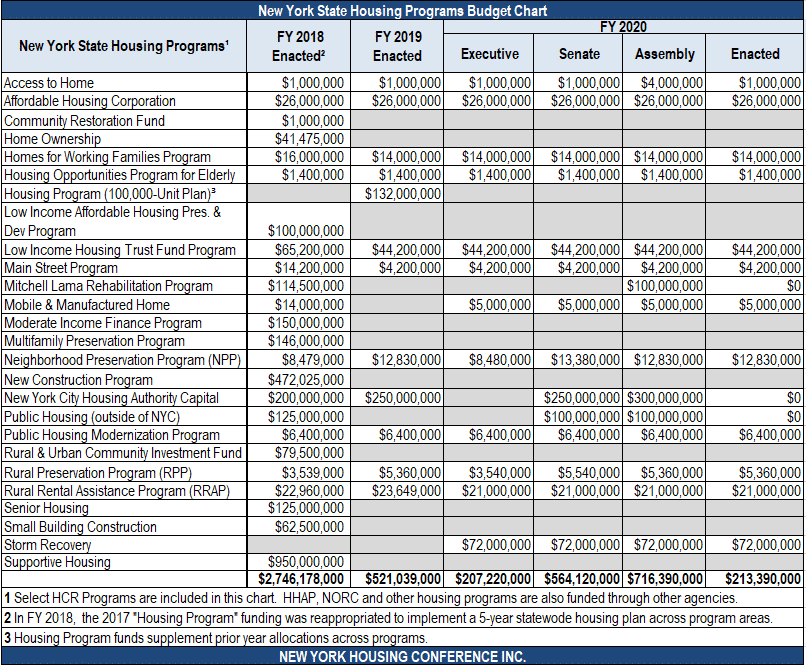Earlier this week New York State Lawmakers passed a $175 billion budget adopting several progressive policy changes with some notable exceptions- public housing being the glaring one. NYHC housing has been advocating for long-term capital funding for NYCHA and dedicated revenue from luxury real estate taxes. The failure of Albany lawmakers to include public housing in their robust budget deal is disheartening given the challenges facing NYCHA’s future and insufficient federal funds. Given the renewal of the rent laws in June, there may be some post-budget opportunity to revisit the need for public housing capital funding. A statement issued by the housing chairs, Senator Brian Kavanagh and Assembly Member Steven Cymbrowitz says that an agreement on public housing funding wasn’t reached and they are “deferring any decision on these proposals until later in the legislative session”.
Here are some updates on our other housing priorities in the budget:
- ZERO PUBLIC HOUSING FUNDING- The Assembly had called for $400 million for public housing ($300 million for NYHCA and $100 million outside of NYC). The Senate’s budget proposed $350 million ($250 million for NYHCA and $100 million outside of NYC). Governor Cuomo’s Executive Budget called for $0. At this critical time for public housing in NYC, each level of government must commit resources to restoring living conditions for public housing. See a statement from NYHC and some of the members of the Coalition for Capital Investment to #SAVENYCHA.
- RENTER SOURCE OF INCOME PROTECTIONS ENACTED!- A new statewide standard for discrimination will protect renters who are currently denied housing solely based on their source of income. NYHC is proud to be partners on the successful enactment of this important change to NY State law to expand housing opportunity to renters, 600,000 of whom have some form of supplemental income. We thank our partners in the #BanIncomeBiasNY campaign including the Fair Housing Justice Center and Erase Racism and especially thank Enterprise Community Partners, Inc. for their leadership. See a full statement on this exciting victory.
- NO NEW PREVAILING WAGE REQUIREMENTS- Both the Senate and Assembly proposed new prevailing wage requirements for both construction and building service workers in their one house budget bills. We are grateful that these costly requirements were left out of the budget as they would significantly reduce production of affordable housing. Governor Cuomo has expressed a desire to expand prevailing wage requirements this session but also stated the importance of not impacting affordable housing. We expect our advocacy on this issue will continue into June.
- NEW FORECLOSURE FUNDING- $25 million is provided for housing and foreclosure counseling. With previous funds from AG settlement monies expected to run out, communities and low- and moderate-income homeowners will benefit the extension of these services. NYHC is part of the Coalition for Affordable Homes and a strong supporter of Communities First.
- NEW CENSUS FUNDING- $20 million has been allocated for 2020 Census outreach funding across New York State. This is half of what advocates recommended. Let’s hope it is sufficient as there is much to lose in an undercount- including representation in Congress! NYHC is a proud member of the NY Counts 2020 Coalition.
- RENT LAW ENFORCEMENT FUNDING- The budget provides a total of $64 million for administration and enforcement of rent regulation in New York City, Nassau, Westchester, and Rockland, including funding for an additional 94 staff positions, and $5.5 million for the Tenant Protection Unit (TPU). Dedicated funding for TPU had been blocked by the Republican-controlled Senate in previous years.
- TRANSFER TAX- Instead of a pied a terre tax which was building some political momentum, an enhanced transfer tax on real estate was adopted in the budget. The tax is expected to generate $365 million annually. This funding will go towards critical needs at the MTA. REBNY has produced a helpful chart of the new transfer tax sales categories and tax increases.
- PERMANENT 2% PROPERTY TAX CAP- This was a high priority for the governor. This existing cap was made permanent in the budget.
- PACB BOARD- The Public Authorities Control Board approves the allocation of state-controlled bond cap to affordable housing projects among its other functions. Reacting to the threat of PACB board rejection in the failed Amazon deal, the budget includes the following language sought by the Governor as reported by the WSJ. “A member of the board must vote within the scope of his or her legal authority. The legal authority of a member of the board pursuant to this section is solely to determine whether the issuing authority has demonstrated that there is the commitment of funds sufficient to finance the acquisition and construction of the project subject to approval. Failure of a member to vote within the scope of his or her legal authority constitutes a violation of the public’s trust for the purposes of paragraph h of subdivision three of section seventy-four of the public officers law. As the appointing authority, the governor has the full discretion to immediately remove a member of the board he or she finds to be acting, or threatening to act, beyond the scope of such member’s legal authority set forth herein.”
- HOMELESSNESS- Home Stability Support, a new resource for homeless prevention with support in the Legislature, did not get funded.
With little change from the Executive Budget proposal for housing funding, the chart below shows that Governor Cuomo’s budget priorities were adopted. Besides leaving out public housing capital, the budget also failed to provide $100 million for Mitchell Lamas as proposed by the Assembly. There were also some slight differences in NPP/RPP funding amounts. We are pleased that these community programs received increased funding this year.
Since much of the 5-year statewide affordable housing plan received multi-year funding in FY 2018, this budget makes modest increases to resources available to HCR to implement the housing plan.
